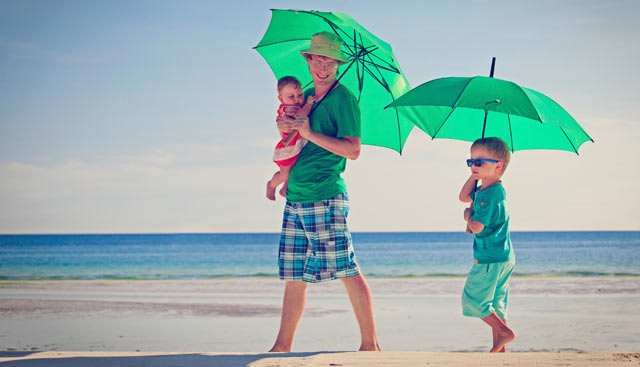
Don’t Fry Day – Protect Yourself From Skin Cancer Today and Every Day
Skin cancer is by far the most common type of cancer. With more than 3.5 million cases diagnosed each year in the United States, its incidence has reached epidemic proportions. But, the good news is that almost all cases are entirely preventable.
Even though people with fair skin tend to be more susceptible to developing skin cancer than their darker-skinned counterparts, the condition can affect anyone regardless of their skin tone. In fact, evidence shows that most cases of skin cancer are the direct result of ultraviolet (UV) radiation exposure. There are two harmful types of UV rays – UVA and UVB. While UVB exposure can lead to sunburn and tanning, UVA rays penetrate the skin more deeply, resulting in permanently damaged skin (photoaging).
UV exposure that causes skin cancer generally comes from two sources: the sun and indoor tanning devices. For these reasons, indoor tanning should be completely avoided, and time outdoors should be limited, especially between the hours of 10 a.m. and 4 p.m., when the sun’s harmful UV radiation is most intense.
With the proper use of a good sunscreen, it may be possible to prevent sun damage and still enjoy the great outdoors. Because sunscreens can effectively shield the skin from UV rays (through a combination of several active chemical and physical ingredients), most experts recommend their daily use by everyone – including those who spend most of their time indoors (UV rays can penetrate windows).
There are many sunscreens available on the market, but they vary widely in their effectiveness against skin cancer. The best choice is a broad-spectrum or multi-spectrum product that protects against both UVA and UVB radiation. Some of the key features and ingredients to look for include:
- Absorption of UVB rays – PABA derivatives, salicylates or cinnamates (octylmethoxycinnamate or cinoxate)
- Protection from short-wave UVA rays – Benzophenones (oxybenzone or sulisobenzone)
- Protection from the remaining UVA spectrum – Titanium dioxide, zinc oxide, avobenzone or ecamsule
Because no sunscreen is capable of blocking all UV rays, it’s important to take other precautions when spending time in the sun. For instance, clothing is the single most effective form of protection, so it’s always best to wear a long-sleeved shirt, pants, a brimmed hat and sunglasses when outdoors.
If you have questions about skin cancer, you can turn to the multispecialty team of experts in the Cutaneous Oncology Program at Moffitt Cancer Center. We offer comprehensive services for all types of skin cancer, including the latest options in screening, diagnostics, staging, treatment and long-term follow up. To speak with one of our experts, call 1-888-663-3488 or complete a new patient registration form online. No referrals are needed.
